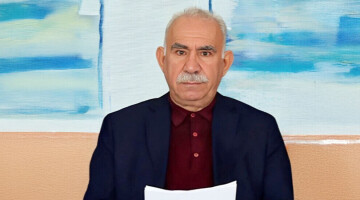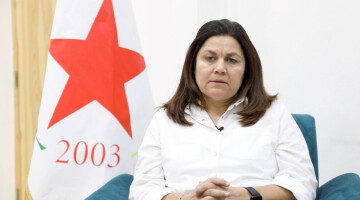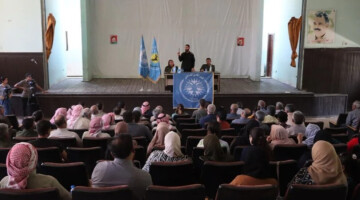The UK-EU Parliamentary Delegation continues its talks in Kurdistan. The 14-member delegation, including lords, met yesterday with Kurdistan Region Prime Minister Masrour Barzani and KDP Leader Massoud Barzani, before moving on to northern and eastern Syria.
During the meeting with Massoud Barzani in the city of Salahaddin, Barzani presented a brief history of the massacres suffered by the people of Kurdistan. The call for Peace and Democratic Society made by Kurdish leader Abdullah Öcalan on February 27 was also discussed in the meeting. It was pointed out that as long as there is an opportunity for peace and the ways to a solution are open, no side should resort to conflict.
Meeting with the Syriac Council
After meetings in Southern Kurdistan, the delegation moved to Rojava and held their first meeting with the representatives of the Syriac Council. Madira Gavriye, Foreign Relations Representative of the Syriac Council, welcomed the delegation. Gavriye briefed the parliamentarians about the situation of Christians and Syriacs in the region, expressing her concern about the existential threat facing Christian communities amid ongoing mass migration. Referring to the Turkish aggression against North and East Syria, Gavriya said that Turkey continues to cut off the flow of water on the Khabour River, resulting in the river drying up and severely damaging the livelihoods of the Syriac people.
'A joint committee to be established to oversee the process of drafting the new constitution'
The delegation then met in Qamishlo with Ilham Ehmed, Co-Chair of the Foreign Relations Department of the Autonomous Administration of North and East Syria, and received comprehensive information on the latest political, security and economic developments in the region.
Ilham Ehmed said that the dialogue between the Kurdish political parties is still ongoing and that serious talks on unity are taking place. On April 18, she said, a conference will be organized and then a joint committee will be established to oversee the process of drafting the new Syrian constitution.
Ilham Ehmed emphasized the importance of inclusive participation of all social segments in the constitutional process and stated that new committees will be formed to bring together different social components to contribute to this process. Ehmed emphasized that the establishment of these committees is a necessary step to be taken before proceeding with the drafting of the constitution. Mentioning the US sanctions against Syria, she said that Rojava is not exempt from this situation.
‘Attacks by Turkey have led to humanitarian crises’
Ehmed also spoke about the invading Turkish state's ongoing attacks on North and East Syria. She stated that the deliberate cutting of water sources has led to a serious drought, especially in the Hesekê canton, and about one million people have no access to clean drinking water. She emphasized that these attacks by Turkey have led to humanitarian crises.
The Kurdish politician also criticized the Damascus regime, saying that it is based on a purely Islamic and Salafist ideology and therefore cannot represent the multinational and multicultural structure of Syria. She pointed out that the regime portrays a sensitive image to the international community, but its actions contradict this image.
Finally, Ehmed highlighted the importance of drafting a clear and inclusive constitution that will form the basis for transparent and democratic elections. Without such a document, she warned, questions about the electoral system and procedures will continue to pose serious problems.
As part of their visit to Rojava, the delegation will also meet with Mazloum Abdi, Commander General of the Syrian Democratic Forces (SDF).














